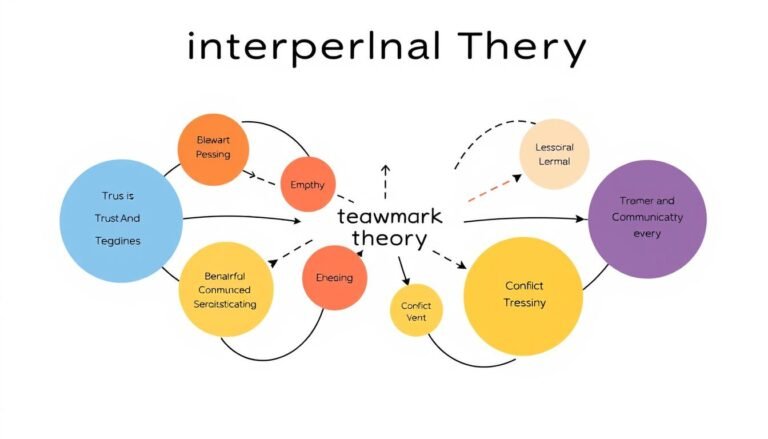Exploring Existential Theory: A Friendly Guide
Ever thought about the meaning of life or your place in the universe? You’re not alone. These questions are at the core of existential theory, a compelling way to understand human existence.
Existential theory, based on phenomenology and existentialism, gives us a special way to see our experiences and choices. It’s not just about big ideas; it’s about us, our lives, and our shared journey.
This guide will lead you through the main ideas of existential theory. We’ll dive into the concept of Dasein – our unique way of being in the world. You’ll learn how this view can help us tackle life’s hurdles, find purpose, and make real choices.
Did you know existential ideas have shaped therapy and personal growth for years? A 1999 report by the Substance Abuse and Mental Health Services Administration showed how these ideas help those with addiction. They address deeper issues like meaninglessness and fear of death.
So, if you’re interested in philosophy, looking for personal growth, or just want to understand yourself more, stay with us. We’re about to explore existential theory together. It might just change how you see the world – and yourself.
Understanding the Basics of Existential Theory
Existential theory gives us a special way to see what makes us human. It says we are flexible and can have many experiences. We are always growing and changing.
This view focuses on creating ourselves and not being stuck in labels. It looks at what we all share as humans.
Key Concepts in Existentialism
Anxiety is a big part of existentialism. It’s not just everyday stress. It’s a deep feeling we get when we think about life’s big questions.
It happens when we realize how small we are and how our choices matter. Freedom of choice is also key. It shows we can make our own way in life.
Historical Background and Influential Thinkers
Søren Kierkegaard is known as the father of existentialism. He lived in the 1800s and believed in living in the real world. He didn’t like just thinking about abstract ideas.
Later, thinkers like Otto Rank and Viktor Frankl took these ideas further. They used them in therapy. They helped people focus on their feelings and finding meaning in life, even when things are tough.
Core Principles of Existential Theory
Existential theory is built on a few main ideas. It values being true to oneself. It also sees us as having four parts: physical, social, psychological, and spiritual.
It tells us to face our fears and find our own meaning in life. This helps us grow as individuals.
| Principle | Description |
|---|---|
| Authenticity | Living true to oneself |
| Freedom of Choice | Ability to shape one’s life |
| Facing Anxiety | Confronting life’s big questions |
| Finding Meaning | Creating personal significance |
By learning these basics, we can understand how existential theory sees us. It shows us how we can grow and change as individuals.
The Four Dimensions of Human Existence
Existential theory looks at four main parts of human life: Umwelt, Mitwelt, Eigenwelt, and Überwelt. These parts help us grasp the complexity of our lives and the world we live in.
The Umwelt is about our physical world. It includes our bodies, the places we live, and our own death. We often try to feel safe by being healthy and wealthy. But, we all face the limits of our lives.
Mitwelt is about how we interact with others and our culture. We deal with feelings of being accepted or rejected, and feeling like we belong or are alone. Some people pull back from others, while others seek fame or power.
Eigenwelt is our inner world. It’s about our personal experiences, who we are, and what the future holds. We look for who we are and try to affirm ourselves. Life’s events can confuse us, especially when we face loss and death.
The Überwelt is our spiritual side. It’s about finding meaning and purpose in life. This part is about finding something worth living or dying for. We create values to find this purpose.
| Dimension | Key Aspects | Challenges |
|---|---|---|
| Umwelt (Physical) | Environment, body, mortality | Security vs. limitations |
| Mitwelt (Social) | Interactions, culture | Belonging vs. isolation |
| Eigenwelt (Psychological) | Self, experiences, possibilities | Strength vs. weakness |
| Überwelt (Spiritual) | Meaning, ideologies | Purpose vs. absurdity |
Understanding these four parts helps us deal with life’s challenges. By seeing how Umwelt, Mitwelt, Eigenwelt, and Überwelt work together, we can understand ourselves and our role in the world better.
Existential Theory and Personal Growth
Existential theory gives us powerful insights for growing personally. It teaches us to create our own meaning and purpose. This way, we can make choices and shape our identity.
Authenticity and Self-Discovery
Existential theory values authenticity for personal growth. It encourages us to find out who we really are, not just what society expects. This journey of self-discovery is tough but vital for a fulfilling life.
Facing Anxiety and Embracing Freedom
Anxiety is a natural part of being human. Existential theory sees it as a chance for growth. By facing our fears about freedom, responsibility, and death, we become stronger and more resilient.
Finding Meaning in Life
The search for meaning is key in existential theory. It tells us to find our own purpose, even when life seems absurd. This search can lead to a higher level of satisfaction and transcendence.
| Existential Concern | Growth Opportunity |
|---|---|
| Freedom | Embracing responsibility |
| Isolation | Cultivating meaningful connections |
| Death | Living with greater purpose |
| Meaninglessness | Creating personal significance |
Existential theory pushes us to face life’s big questions. By doing this, we gain wisdom, live more intentionally, and find deeper meaning. This path to personal growth is challenging but leads to a more authentic and fulfilling life.
Existential Theory in Psychotherapy
Existential psychotherapy helps people find meaning in their lives. It comes from existential philosophy, focusing on personal responsibility and purpose. This therapy became popular after World War II, when many questioned life’s meaning.
This therapy deals with four main themes: isolation, death, meaninglessness, and freedom. Therapists help clients explore these themes deeply. This builds a strong bond between them.
It’s especially good for those with substance abuse issues. It helps tackle spiritual emptiness and underlying problems.
The bond between therapist and client is key in existential psychotherapy. Therapists offer empathy and acceptance. This creates a safe space for clients to gain insight and make new choices.
This can boost self-respect, motivation, and personal growth. It’s great for short-term substance abuse treatment.
“Existential psychotherapy is not about fixing problems, but about helping individuals create a meaningful life.”
Research shows existential psychotherapy helps many groups. This includes people with advanced-stage cancer and those in prison. It’s also good for anxiety, depression, PTSD, or feeling meaningless.
By focusing on personal choice and responsibility, it empowers clients. It helps them shape their future and reach their full potential.
Exploring the Concept of Existential Vacuum
The term “existential vacuum” was coined by Viktor Frankl. It describes a feeling of emptiness and lack of purpose in life. In today’s world, where old values and community bonds are fading, this issue is more common than ever.
More than 50% of young people worry about finding meaning in their lives. This shows how widespread the problem is.
Symptoms of Existential Neurosis
Existential neurosis can show up in many ways. People might feel empty, worthless, and have low self-esteem. They might also feel bored, apathetic, and unhappy with their lives.
Kurt Cobain’s battle with drug addiction and loss of joy is a sad example. It shows how the existential vacuum can affect even those who seem to have everything.
Purpose Substitutes and Defense Mechanisms
To deal with the existential vacuum, people often use substitutes. These can be addictive behaviors, shallow relationships, or an endless chase for wealth and fame. Frankl believes that people might seek pleasure to distract themselves from the emptiness.
These substitutes help temporarily but don’t solve the real problem. They act as defense mechanisms, trying to fill the void but failing to do so.
Overcoming Existential Vacuum
To beat the existential vacuum, we need to see through these substitutes and find true purpose. Existential therapy helps by making us aware of our choices and freedom. Tara Brach says that much of our suffering comes from thinking we’re separate from others.
By understanding our connection to others, as Zen Master Thich Nhat Hanh teaches, we can find true fulfillment. Doing meaningful work, building connections, and being resilient in the face of suffering can help us overcome the existential vacuum.
Source Links
- Chapter 6 –Brief Humanistic and Existential Therapies – Brief Interventions and Brief Therapies for Substance Abuse
- Reaching the end : an exploration of attachment and existential theory as a path to assist in the dying process
- Existentialism Reading List – The Best 9 Books to Read | Philosophy Break
- What to Know About Existentialism—Philosophy and Existential Therapy
- What is existential therapy? | Types of therapy
- Key Concepts in Existential Therapy • Counselling Tutor
- Existential Theory: History, Beliefs, Uses, and More
- Existential Approaches and Cognitive Behavior Therapy: Challenges and Potential
- The Existential Approach | NPSC Ltd
- Existential theory and therapy: Definitions, benefits, and more
- Existential Theory and Therapy: What Do the Two Have in Common?
- What Is Existential Therapy?
- Facing an Existential Vacuum Today
- Navigating the Abyss: Discovering Meaning and Purpose in the Existential Vacuum








